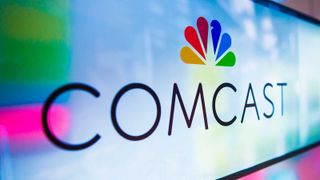Pandemic Pressures Comcast Q2

Video subscriber losses doubled and broadband customer increases reached record levels at Comcast in the second quarter, the first full quarter affected by COVID-19.
Comcast said it lost 477,000 video customers in the period, more than double the 224,000 it lost in the prior year. At the same time, broadband had its best second quarter in 13 years, with subscribers rising by 323,000 in the period, compared to an increase of 209,000 in the same period last year. Comcast said the broadband growth did not include more than 600,000 additional high-risk or free Internet Essentials customers that receive service but were not included in reported results.
Despite the decline in video customers, Cable Communications revenue was essentially flat at $14.4 billion, while EBITDA at the distribution segment was up 5.5% to $6.2 billion, driven exclusively by broadband gains.
Overall consolidated revenue was down 11.7% to $23.7 billion and EBITDA declined 9.1% to $7.9 billion, mainly due to a sharp falloff in its cable network and movie studio businesses.
At NBCUniversal, revenue dipped 25.4% to $6.1 billion and EBITDA fell 29.5% to $1.6 billion as declining ad revenue and pressure from pandemic-related closures at its Theme Parks and movie studio ruled the day.
Cable network revenue fell 14.7% in the quarter, as ad sales dipped 27% and distribution revenue was down 14.8% reflecting credits accrued at some of its regional sports networks from the decreased number of games played by pro sports leagues and declines in pay TV customers. EBITDA was up 3.5% in the period, mainly because of lower programming and operating costs.
Broadcast revenue was down 1.6% in the quarter to $2.4 billion, reflecting a 28% decline in ad revenue. Content licensing revenue was up 58.5%, primarily due to licensing deals with its own Peacock streaming service, which debuted to Comcast customers in April but launched nationally on July 15, and retransmission consent revenue was up 9.2%, primarily due to higher retransmission consent fees. That helped drive a 20% increase in adjusted EBITDA to $641 million in the period.
Multichannel Newsletter
The smarter way to stay on top of the multichannel video marketplace. Sign up below.
Filmed Entertainment revenue was down 18.1% to $1.2 billion, driven by a 96.8% decline in theatrical revenue.
Content licensing revenue increased 19.5%, helped by titles that were made available on premium video on demand like Trolls World Tour and The King of Staten Island, and deals with Peacock in the period. Lower operating costs as the pandemic shut down most production in the quarter, helped drive adjusted EBITDA up 24.8% to $228 million in the quarter.
Comcast announced earlier this month that it is narrowing the window between theatrical and VOD releases with theater chain AMC Entertainment from 75 days to 17 days.
“Our response to COVID-19 has been extraordinarily fast and effective, and our products and brands continue to resonate strongly with our customers across all segments and all geographies,“ Comcast chairman and CEO Brian Roberts said in a press release. “The solid results that we delivered in the quarter highlight the resilience of our company...Overall, based on our results and the many organic growth opportunities that we have across our company, I am confident in our ability to continue to successfully navigate the impact of COVID-19, and emerge from the crisis even stronger. I could not be more proud of how our teams across Comcast Cable, NBCUniversal and Sky are together managing the business."
